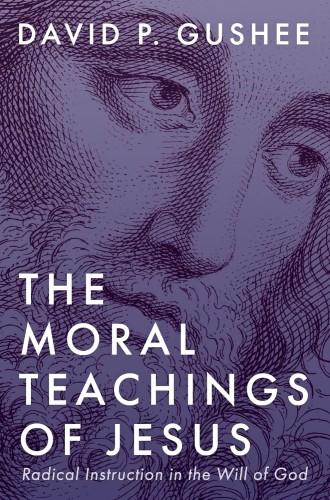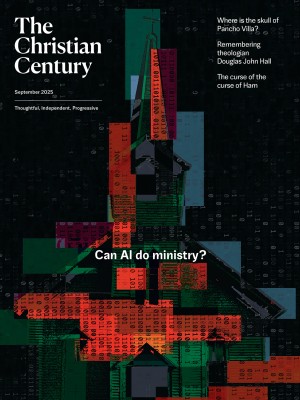The morality of Jesus reinterpreted
Writing primarily for post-evangelicals, ethicist David Gushee examines 40 biblical texts.

The Moral Teachings of Jesus
Radical Instruction in the Will of God
The Pew Research Center announced last year that nones—those who claim no religious affiliation—now constitute the largest single faith cohort in the United States. Around the same time, Russell Moore, editor in chief of Christianity Today, wrote about several evangelical pastors who, after quoting directly from Jesus’ Sermon on the Mount, were told by members of their congregations that “liberal talking points,” such as loving one’s enemies and turning the other cheek, are weak and don’t work anymore. These trends may well prove related. Throughout history, whenever Christians edit the good news according to their politics, it’s usually to the harm of some marginalized group and always to the discredit of the gospel message.
In his short but profound new book, ethicist David Gushee, a self-identified post-evangelical, writes especially for those who are exiting traditions in which they were raised, noting that “their churches no longer seem to have much to do with the Jesus whom they are supposed to be about.” In response, he returns to the gospel texts, interpreting for modern Christians what Jesus taught his followers about right action in the world. Though this text will serve quite well in an introductory course on Christian ethics, it is written in an accessible, nonacademic style—an admirable result, given the scholarship reflected in the content.
Read our latest issue or browse back issues.
Readers familiar with Kingdom Ethics, the widely used textbook Gushee cowrote with the late Glen Stassen, will recognize a similarly robust, critically informed, and nuanced approach to scriptural exegesis here. Gushee supplements insights and conclusions found in Kingdom Ethics with a diverse selection of sources, including The Jewish Annotated New Testament, the Women’s Bible Commentary, recent works from Black and Latinx scholars, and two mid-20th-century classics, Dietrich Bonhoeffer’s Discipleship and Howard Thurman’s Jesus and the Disinherited. The result is a compelling vision of Christian community that rejects cultural accommodation and political power for a radical, Jesus-centered commitment to justice, peaceable witness, and humble service.
Starting with the Gospel of Mark, Gushee examines 40 texts in which Jesus shares a specific ethical concept or injunction reflecting God’s will for humanity. These brief, highly readable chapters employ a variety of critical resources to grasp how scriptural statements remembered and recorded in the first century remain applicable today.
Some of the texts and interpretations are as much descriptive as prescriptive. For example, Gushee’s exegesis of Mark 1:14–15, Jesus’ proclamation of the in-breaking kingdom, focuses far more on the meanings found in the phrase “kingdom of God” than on the call to repent. In Gushee’s reading, Jesus’ emphasis on God’s mercy over John the Baptist’s warning of divine wrath acknowledges the reality and consequences of human sinfulness within a story of redemption and deliverance. While Gushee concedes that the monarchical, male-centered word kingdom reinforces language and habits the church must make more inclusive, he stresses that the inherent theological, eschatological, and moral teachings of that passage remain powerful motivations for Christians to act in this world with compassion and justice.
As he works through the four gospels, Gushee devotes much attention to Matthew, especially the Sermon on the Mount and several parables. He makes good use of Stassen’s “transforming initiatives” interpretation of the sermon, which reads the so-called antitheses in chapter 5 not as old versus new interpretations of the law but as triadic instructions: a traditional statement of righteousness, followed by examples of sinful patterns associated with inadequate or misguided observance, and ending with a renewed and deepened understanding of the original commandment.
In this formulation, Jesus’ gloss on the commandment against murder, which apparently equates anger with homicide (Matt. 5:21–22), is reconfigured so that human patterns of escalating rancor that result in lethal violence are preempted by simple but powerful acts of reconciliation and peacemaking (Matt. 5:23–26). This three-part reading avoids two common interpretive traps in the traditional dyadic interpretation. The first is perfectionism, as with Reinhold Niebuhr’s conclusion that Jesus’ moral teaching, while admirable, was not humanly achievable. The second, anti-Judaism, takes the “You have heard it said . . . but I say to you” formula of the antitheses in a supersessionist direction, as if Jesus, contra Matthew 5:17, meant to abolish the law rather than fulfill it. Neither interpretation, Gushee asserts, is consistent with the rest of Jesus’ moral teaching. In applying this triadic reading to modern Christian life, Gushee draws on Thurman’s distinction between righteous anger and hatred. The former can be a natural response to injustice, especially for historically oppressed groups, while the latter is ultimately destructive.
After gleaning similarly incisive lessons from Luke and John, Gushee looks at three challenging moments in the Passion Week narratives: the money changers in the temple, the question of paying taxes to Caesar, and the judgment of the nations. He takes special care to preclude anti-Jewish readings of these texts, while stressing the revolutionary implications for church institutions, the role of the state, and service to and with the vulnerable. In his concluding chapter, Gushee draws his exegeses together, calling attention to the chasm between what humanity esteems and what God desires, while never losing sight of God’s infinite mercy.
What God wants, Gushee writes, is “a radically reoriented humanity,” beginning with a church where the love of God, active compassion for the vulnerable, and wholehearted, humble repentance serve as markers of its commitment to turn the world’s values upside down. Although the world, including some in the church, will strongly oppose this radical reorientation, this is where Jesus calls us: a life that may prove costly but is true to the gospel. We can only wonder what the church would look like if all of its members acted accordingly.





